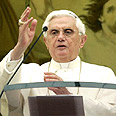Pope Benedict XVI said Thursday that his predecessor Pius XII spared no effort to save Jews from the Nazis, one of the strongest Vatican defenses of a pontiff accused of silence during the Holocaust.
Benedict said during a meeting with a US-based interfaith group that he wanted any prejudice against Pius to be overcome, praising what he called Pius's "courageous and paternal dedication" in trying to save Jews.
"Wherever possible he spared no effort in intervening in their favor either directly or through instructions given to other individuals or to institutions of the Catholic Church," Benedict said.
Pius XII reigned from 1939 to 1958 and was a Vatican diplomat in Germany, and its secretary of state before that. Some historians say that he did not do everything in his power to prevent Jews from being deported to concentration camps. His supporters say he made every effort to help Jews and other victims through quiet diplomacy.
Benedict said that Pius' many interventions were "made secretly and silently, precisely because, given the concrete situation of that difficult historical moment, only in this way was it possible to avoid the worst and save the greatest number of Jews."
The Vatican has rejected the accusations against Pius, and has started the process for his beatification. But the process has gone on for some years and there's been no indication that it is moving forward.
Pius' wartime conduct is an unresolved issue in the Vatican's delicate relations with Israel and with Jews, many of whom share in the criticism of Pius.
Jews and others have accused him of not speaking out loudly enough against the Holocaust. Six million Jews were killed by the Nazis.
'Pastoral intensity'
Last year, the caption of a photo of Pius at Yad Vashem Holocaust memorial in Jerusalem was the subject of a public spat between the Holy See and Israel. The caption said Pius did not protest the Nazi genocide of Jews and maintained a largely "neutral position."
In Italy, under Pius' papacy, convents opened up their doors to hide Jews during the Nazi occupation.
Benedict said the interfaith Pave the Way Foundation had gathered material that showed the extent of Pius' efforts. The group, based in New York, is active in improving Catholic-Jewish relations and organized a symposium in Rome on Pius.
"So much has been written and said of him during these last five decades and not all of the genuine facets of his diverse pastoral activity have been examined in a just light," the pope said during the meeting with members of the group in Castel Gandolfo, the papal summer retreat.
"One can also come to appreciate the human wisdom and pastoral intensity which guided him in his long years of ministry, especially in providing organized assistance to the Jewish people," Benedict said.
The pope said Pius' efforts were recognized by Jewish communities and individuals during and after World War II. He said that on Nov. 29, 1945, shortly after the end of the conflict, 80 delegates of German concentration camps came to the Vatican and thanked Pius "for his generosity to them."
The German-born Benedict, a member of the Hitler Youth when he was a seminarian, has made a point of reaching out to Jews, following in the footsteps of his predecessor, John Paul II. He has publicly condemned the Nazi regime and mentioned the Holocaust on several occasions. During a trip to Poland in 2006, he prayed at the Auschwitz concentration camp.
This year is the 50th anniversary of Pius' death, and Benedict said he hoped that commemorations would provide the opportunity for further study "in order to come to know the historical truth, overcoming every remaining prejudice."
















